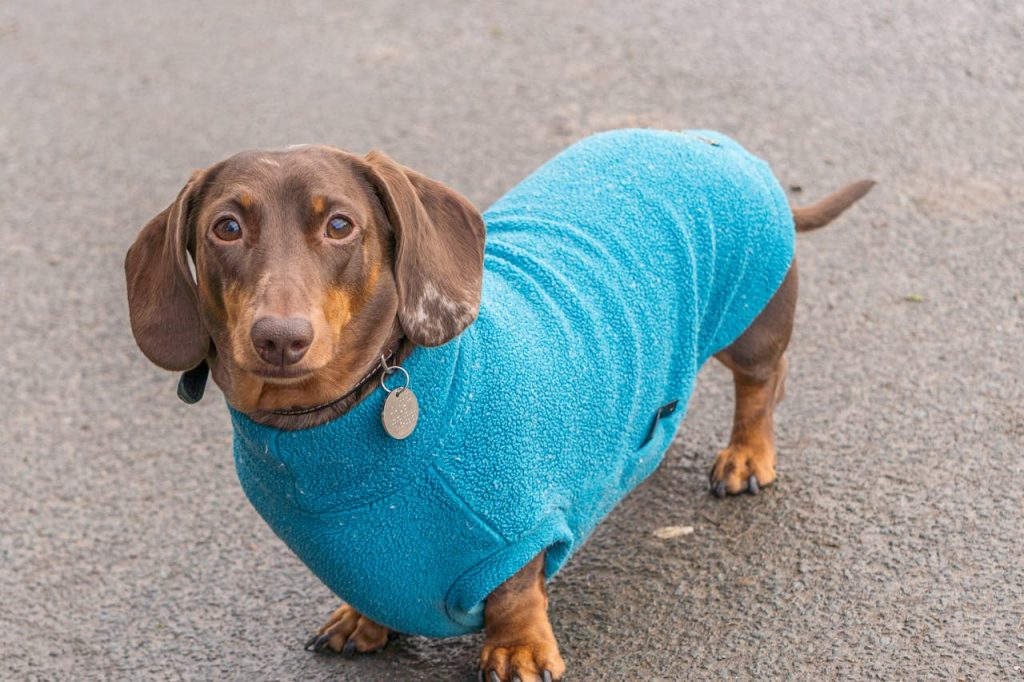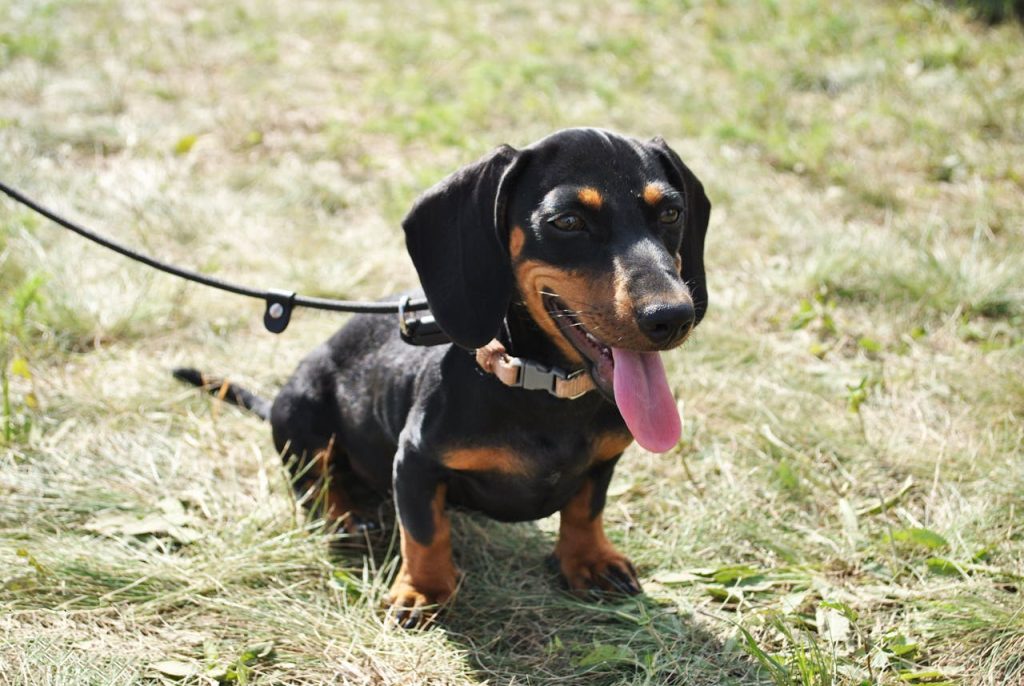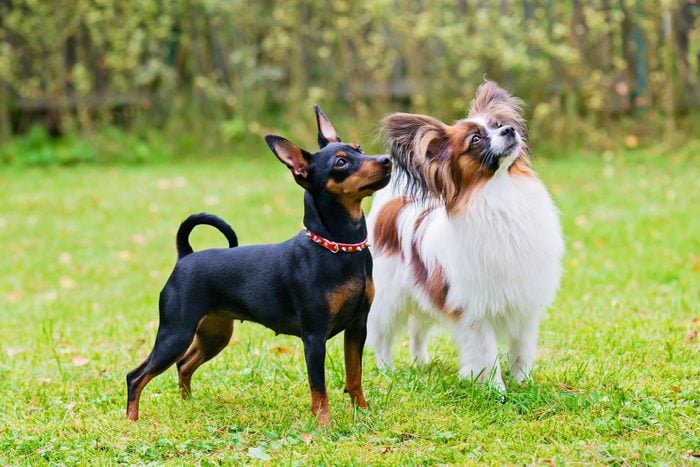Dachshunds, often affectionately called “wiener dogs,” are a small yet spirited breed known for their elongated bodies and short legs. Despite their size, they are courageous, energetic, and full of personality.
Originally bred for hunting, these tenacious little dogs have become beloved companions worldwide. In this guide, we will explore everything you need to know about Dachshunds, from their history to their care requirements, helping you determine if this breed is the right fit for your home.

Table of Contents
History and Origin of Dachshunds
Dachshunds originated in Germany over 600 years ago. Their name translates to “badger dog” in German, reflecting their original purpose: hunting burrowing animals like badgers and rabbits.
Breeders selectively developed their elongated bodies and strong front paws to allow them to dig and maneuver underground with ease.
By the 19th century, Dachshunds had gained popularity beyond hunting circles and became cherished family pets.
Their charming personalities and adaptability made them favorites among European royalty, including Queen Victoria, who played a key role in popularizing the breed.
Why Dachshunds Were Created
Dachshunds were specifically bred for hunting. Their fearless nature, determination, and unique body structure allowed them to chase and corner prey in underground tunnels. Their loud bark and keen sense of smell also made them excellent tracking dogs.
Over time, their role expanded beyond hunting, and today, they are known as loving companions and even successful competitors in dog sports like agility and obedience.
Physical Characteristics of Dachshunds
Dachshunds come in three coat types—smooth, long-haired, and wire-haired—and in two sizes: standard and miniature. Standard Dachshunds typically weigh between 16-32 pounds, while miniature Dachshunds weigh under 11 pounds.
They have a distinctive long bodies, short legs, and an expressive face. Their ears are long and floppy, adding to their endearing appearance. Despite their small stature, they are sturdy, muscular dogs built for endurance and agility.

Temperament and Personality of Dachshunds
Dachshunds are known for their bold, playful, and sometimes stubborn personality. They are highly intelligent and independent but also deeply loyal to their families. They thrive on companionship and can be quite affectionate.
Their strong prey drive means they may be prone to chasing smaller animals. They can also be protective, making them excellent watchdogs. However, they require consistent training and socialization to prevent excessive barking or stubborn behavior.
Bite Force and Jaw Strength
Dachshunds have a moderate bite force compared to larger breeds, but their jaw strength is notable for their size. Since they were bred for hunting, their bite is powerful enough to grip prey effectively.
While they are not naturally aggressive, proper training is necessary to ensure they develop good manners around people and other animals.
Choosing the Right Dachshund Puppy
Selecting a Dachshund puppy requires careful consideration. Look for a reputable breeder who prioritizes health and temperament. Since Dachshunds can be prone to back issues (intervertebral disc disease), ensure the breeder conducts health screenings.
Observe the puppy’s behavior. A well-socialized Dachshund puppy should be curious, confident, and interactive. Avoid puppies that appear overly shy or excessively aggressive.
To ensure you’re making the best choice, check out our Guide to Choosing Your Dream Puppy, which provides detailed tips for selecting the right furry friend for your family.

Intelligence and Training
Dachshunds are intelligent but independent, which can make training a challenge. They respond best to positive reinforcement techniques, as harsh training methods may cause them to become stubborn.
Consistency is key. Early socialization and obedience training will help them develop good habits. Teaching them to recall commands like “stay” and “leave it” is essential, especially due to their strong prey drive.
Exercise and Energy Levels
Despite their small size, Dachshunds are energetic dogs that require regular exercise. Daily walks, playtime, and mental stimulation will keep them happy and prevent boredom-related behaviors like excessive barking or chewing.
Avoid high-impact activities that could strain their long backs, as they are prone to spinal issues. Instead, opt for controlled exercise and activities that keep them active without putting excessive stress on their spines.

Diet and Nutrition
A balanced diet is crucial for Dachshunds to maintain a healthy weight and prevent obesity, which can exacerbate back problems. High-quality dog food rich in protein, healthy fats, and essential vitamins is ideal.
Portion control is important, as Dachshunds love to eat and can easily gain weight. Treats should be given in moderation, and regular vet check-ups can help ensure they maintain a proper diet.
Health and Lifespan
Dachshunds generally live between 12-16 years but are prone to certain health issues, including:
- Intervertebral Disc Disease (IVDD): A common spinal issue due to their elongated backs.
- Obesity: Extra weight can strain the spine and joints.
- Dental Issues: Small breeds are more prone to dental problems, so regular teeth cleaning is essential.
Regular vet visits, a healthy diet, and proper exercise can help maintain their overall health and longevity.
Grooming and Coat Care
Grooming needs vary depending on the coat type:
- Smooth-haired Dachshunds: Require minimal grooming; occasional brushing is enough.
- Long-haired Dachshunds: Need regular brushing to prevent tangles.
- Wire-haired Dachshunds: Require hand-stripping or trimming to maintain their coat.
All Dachshunds benefit from routine ear cleaning, nail trimming, and dental care.

Working Roles and Versatility
Although primarily companion dogs today, Dachshunds still excel in roles such as:
- Hunting small game
- Tracking and scent detection
- Dog sports like agility and earth dog trials
Their determination and intelligence make them highly adaptable to various activities beyond just being household pets.
Fun Facts About Dachshunds
- They were originally bred to hunt badgers.
- A Dachshund named Waldi was the first official Olympic mascot in 1972.
- They come in a variety of coat colors and patterns.
- Their playful and curious nature makes them natural entertainers.
Challenges of Owning a Dachshund
While Dachshunds are lovable companions, they come with challenges:
- Prone to barking if not trained properly.
- Strong-willed and independent, requiring patience during training.
- Susceptible to back injuries, requiring careful handling.

Tips for Potential Owners
If you’re considering adding a Dachshund to your family, ensure you:
- Provide regular exercise without overexerting them.
- Train them early to prevent stubborn behavior.
- Keep them at a healthy weight to avoid back issues.
Dachshund Puppies: What to Expect
Dachshund puppies are lively, mischievous, and full of personality. They require structured training, socialization, and patience. Early positive experiences will shape them into well-adjusted adult dogs.
Breeding and Reproduction
Responsible breeders focus on health and temperament, screening for genetic conditions, and ensuring ethical breeding practices. Avoid puppy mills, as they often neglect proper health testing.

Final Thoughts on Dachshunds
Dachshunds are a wonderful combination of loyalty, playfulness, and determination. Their compact size, affectionate nature, and lively personality make them ideal companions for many households.
However, their unique body structure and strong-willed personality require dedicated care and training.
If you’re interested in learning about other amazing breeds, check out our guides on Labrador Retrievers, Beagles, Bulldogs, Poodles, German Shepherds, Golden Retrievers, Rottweilers, and French Bulldogs to find the perfect dog for your lifestyle!
FAQs
Is a Dachshund a good family dog?
Yes, they are loyal and affectionate but can be stubborn. Early training and socialization are important.
Are Dachshunds good house pets?
Yes, they adapt well to homes but need regular exercise and mental stimulation.
What is the behavior of a Dachshund?
They are playful, brave, and sometimes stubborn. They can be vocal and protective.
What did Dachshunds hunt?
They were originally bred to hunt badgers, rabbits, and other small animals.




